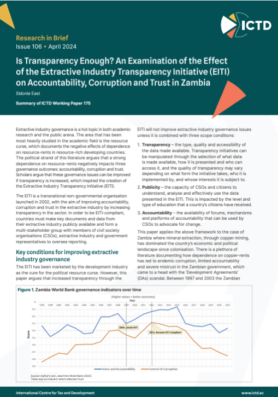Research in Brief 106
Extractive industry governance is a hot topic in both academic research and the public arena. The area that has been most heavily studied in the academic field is the resource curse, which documents the negative effects of dependence on resource-rents in resource-rich developing countries. The political strand of this literature argues that a strong dependence on resource-rents negatively impacts three governance outcomes: accountability, corruption and trust.
Scholars argue that these governance issues can be improved if transparency is increased, which inspired the creation of the Extractive Industry Transparency Initiative (EITI). The EITI is a transnational non-governmental organisation launched in 2002, with the aim of improving accountability, corruption and trust in the extractive industry by increasing transparency in the sector. In order to be EITI-compliant, countries must make key documents and data from their extractive industry publicly available and form a multi-stakeholder group with members of civil society organisations (CSOs), extractive industry and government representatives to oversee reporting.
